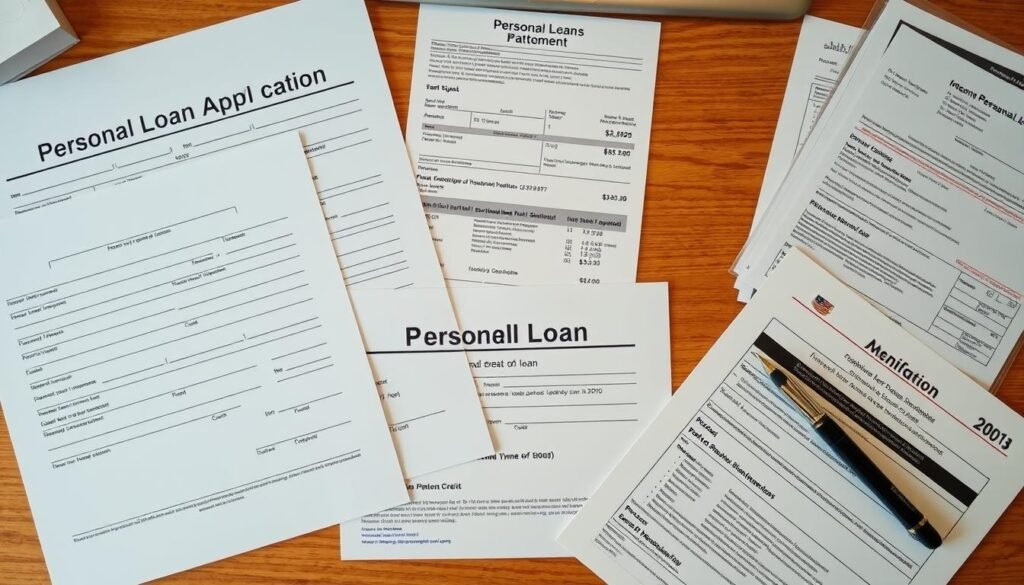Personal loan Eligibility Criteria are great for many needs, like unexpected bills or debt consolidation. But, lenders have rules to follow before they say yes. They look at your credit score, how much you earn, your debt, and sometimes what you own.
Knowing these rules helps you get ready for your loan application. It also boosts your chances of getting the loan you want.
Key Takeaways
- Personal loan eligibility is based on factors like credit score, income, and debt-to-income ratio.
- Lenders typically require a credit score of at least 580 for personal loan approval.
- Debt-to-income ratio should ideally be 35% or lower for personal loan eligibility.
- Collateral may be required for some personal loans, depending on the lender’s policies.
- Understanding the reasons for a personal loan denial can help improve creditworthiness for future applications.
Personal Loan Eligibility Criteria
Lenders look at several important factors to decide if you can get a personal loan. They check your credit score, income, and how much debt you have. These help them see if you can pay back the loan.
Credit Score Requirements
Credit scores range from 300 to 850. A higher score means you’re a safer bet for lenders. Most need a score of 580-669 or 670-739 to approve your loan. If your score is 800 or higher, you might get better terms and lower interest rates.
Things like how you’ve paid bills, how much you owe, and how long you’ve had credit all affect your score.
Income and Employment Verification
Lenders want to know you can afford the loan. They look at your income and job. You’ll need to show recent pay stubs, bank statements, tax returns, and employer details.
Some lenders want to see two years of steady income. This shows you have a reliable job.
Debt-to-Income Ratio Standards
The debt-to-income ratio (DTI) is key for loan approval. It’s your total monthly debt divided by your monthly income. Lenders like a DTI of 35% or less. Some might go up to 50%.
A lower DTI means you’re in better financial shape. It shows you can handle more debt.
| Eligibility Criteria | Typical Lender Requirements |
|---|---|
| Credit Score | Minimum 580-669 (fair) or 670-739 (good) |
| Income and Employment | Minimum 2 years of consistent earnings, pay stubs, tax returns |
| Debt-to-Income Ratio (DTI) | Prefer 35% or lower, may accept up to 50% |
Knowing these criteria can help you improve your chances for a good loan. It’s all about being prepared and showing you can handle the debt.
Essential Documentation for Loan Approval

When you apply for a personal loan, lenders need certain documents. These include proof of who you are, where you live, how much you earn, and your financial situation. Having these ready can make the application smoother and show you’re financially stable.
The most common documents needed for a personal loan are:
- Completed loan application form
- Proof of identity (driver’s license, passport, or state-issued ID)
- Proof of address (utility bill, lease agreement, or bank statement)
- Income verification (pay stubs, tax returns, or bank statements)
- Information about the loan’s intended purpose
Lenders might ask for more documents, like details about collateral or your banking information. Being ready with these can speed up the process and show you’re responsible financially.
| Document | Purpose |
|---|---|
| Completed loan application form | Provides the lender with basic information about the loan applicant and the requested loan |
| Proof of identity | Verifies the applicant’s identity, such as a driver’s license, passport, or state-issued ID |
| Proof of address | Confirms the applicant’s current residential address, such as a utility bill, lease agreement, or bank statement |
| Income verification | Demonstrates the applicant’s ability to repay the loan, such as pay stubs, tax returns, or bank statements |
| Loan purpose | Provides information about the intended use of the loan, which may be required by some lenders |
Gathering these documents early can make the loan application process easier. Remember, each lender might have different needs. So, it’s wise to check with your chosen lender about what they require.
Secured vs. Unsecured Personal Loans: Understanding Your Options

Borrowers face two main choices: secured and unsecured personal loans. The type you pick can change your loan terms, interest rates, and borrowing experience.
Types of Acceptable Collateral
Secured loans need collateral like real estate, vehicles, or savings accounts. The collateral’s value must be at least as much as the loan. Lenders have specific rules for what and how much collateral is acceptable.
Benefits and Risks of Each Option
- Secured loans have lower interest rates and better approval chances. But, there’s a risk of losing your collateral if you can’t pay back the loan.
- Unsecured loans don’t need collateral but have stricter rules and higher rates. If you default, it mainly hurts your credit score, not your assets.
Interest Rate Differences
Secured loans usually have lower rates than unsecured ones. Secured rates range from 6% to 18%. Unsecured rates can go from 8% to 36%, based on your credit and other factors.
| Loan Type | Typical Interest Rate Range |
|---|---|
| Secured Loans | 6% to 18% |
| Unsecured Loans | 8% to 36% |
When picking between secured and unsecured loans, think about your finances, credit, and how much risk you’re willing to take. This will help you choose the best option for you.
Maximizing Your Chances of Loan Approval

When you’re looking for a personal loan, knowing what lenders look for can really help. This includes improving your credit score and reducing your debt. Here’s a detailed guide to help you through the loan approval process with confidence.
Prequalify and Compare Offers
Getting prequalified with several lenders is a smart move. It lets you see different offers and terms without hurting your credit score. Researching various lenders and their needs can help you find the best fit for your finances.
Enhance Your Credit Score
Your credit score is very important for loan approval. To improve it, pay all your bills on time and keep your credit card balances low. These actions can greatly boost your credit score and your loan approval chances.
Manage Your Debt-to-Income Ratio
Lenders also check your debt-to-income ratio. This is your total monthly debt compared to your monthly income. To get approved, pay down your debts or find ways to make more money. Keeping this ratio under 36% is usually best for loan approval.
Consider a Co-signer
If your credit score is not great, getting a co-signer with good credit can help. Lenders see co-signed loans as safer because there’s another person responsible for repayment. This can make them more likely to approve your loan.
By using these strategies, you can improve your chances of getting a personal loan. Understanding these tips can help you navigate the loan approval process more confidently and get the financing you need.
Also Read : How To Improve Credit Score For Loan Approval In Easy Steps
Conclusion
Knowing what lenders look for in personal loan applications is key. Your credit score, income, debt-to-income ratio, and collateral are all important. Understanding these can help you get the loan you need.
Getting ready with the right documents and improving your financial health makes you more appealing to lenders. Whether you go for a secured or unsecured loan, knowing the differences can help you choose wisely.
By understanding the loan application process well and focusing on your financial readiness, you can get the funds you need. With the right strategy, personal loans can help you achieve your goals and secure your financial future.
FAQs
Q: What is mortgage refinance?
A: Mortgage refinance is the process of replacing your existing mortgage with a new mortgage, often with different terms, interest rates, and monthly payment structures.
Q: What are the different types of refinance options available?
A: The main types of refinance options include rate-and-term refinance, cash-out refinance, streamline refinance, cash-in refinance, and short refinance, each serving different financial goals for homeowners.
Q: How does a cash-out refinance work?
A: A cash-out refinance allows you to take out a new mortgage for more than you owe on your existing mortgage. The difference is given to you in cash, which can be used for home improvements, debt consolidation, or other expenses.
Q: What are the benefits of refinancing a mortgage?
A: The benefits of refinancing a mortgage can include lower mortgage rates, reduced monthly payments, access to home equity, and the ability to consolidate debt or switch to a more stable loan type.
Q: What should I consider before refinancing my mortgage?
A: Before refinancing your mortgage, consider the current mortgage rates, closing costs, how long you plan to stay in your home, and whether your credit score qualifies you for favorable refinance rates.
Q: What is a streamline refinance?
A: A streamline refinance is a simplified refinance process that requires less documentation and may have lower closing costs. It is often available for certain types of loans, such as VA and FHA loans, to help borrowers benefit from lower rates without a lengthy approval process.
Q: How do closing costs affect the mortgage refinance process?
A: Closing costs can significantly impact the overall cost of refinancing your mortgage. These costs typically range from 2% to 5% of the loan amount and can include fees for the loan application, appraisal, title search, and other related expenses.
Q: What is a reverse mortgage, and how does it differ from a traditional refinance?
A: A reverse mortgage allows homeowners aged 62 and older to convert part of their home equity into cash without having to make monthly mortgage payments. It differs from traditional refinancing, where borrowers generally take on new debt to reduce payments or cash out equity.
Q: Can I refinance my mortgage if I have bad credit?
A: Refinancing your mortgage with bad credit can be challenging, but it is not impossible. Some mortgage lenders offer specific refinance options that cater to homeowners with lower credit scores, though the terms may not be as favorable.
Q: What is a home equity line of credit (HELOC) and how does it relate to refinancing?
A: A home equity line of credit (HELOC) is a revolving credit line secured by your home’s equity. It can be used in conjunction with refinancing as a way to access funds for home improvements or other financial needs, often providing a flexible financing option for homeowners.
Source Links
- https://www.moneygeek.com/personal-loans/eligibility-requirements/
- https://www.quickenloans.com/learn/personal-loan-requirements
- https://www.nerdwallet.com/article/loans/personal-loans/what-are-the-requirements-for-a-personal-loan

